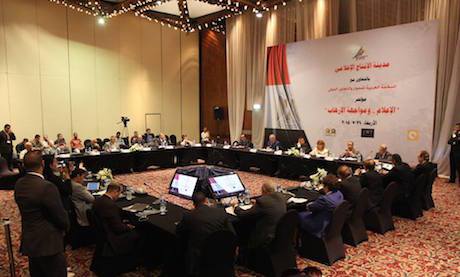
The conference was held in Ramses Hilton Hotel in Cairo Downtown, Egypt, 29 July, 2015 (Photo: Karim Abdel Kodos)
Professionals in the field of journalism discussed what they described as "unprofessional coverage" by Egyptian media of recent terror attacks, providing recommendations on how coverage of such topics can be improved during a Cairo media conference on Wednesday.
The conference, entitled “Media and Confronting Terrorism”, was organized by Egyptian Media Production City (EMPC), the main state broadcaster, and in cooperation with the Arab Organization For Dialogue & International Cooperation (AICO).
The conference began with an opening speech by Osama Heikal, the CEO of EMPC. He stated that the purpose of the conference is to confront media problems in Egypt, especially concerning the war on terrorism.
The conference also submitted recommendations that will be submitted to President Abdel-Fattah El-Sisi.
Egyptian Radio and Television Union head, Essam El-Amir, said that conferences of this type are important to assess the media's status.
“There is a fine line between covering terrorism news and propagating ideologies of terroristic groups,” El-Amir added, referring to a number of instances where media have aired Islamic State propaganda and videos of beheadings.
In a statement to Ahram Online, El-Amir also emphasised the importance of three councils aimed at regulating the Egyptian media which are mandated in the new constitution.
They include the Higher Council for Regulating Media, the National Commission for Audiovisual Media, and the National Commission for state journalism.
These three councils are required by the new constitution, but can only be established once a new Egyptian parliament is elected.
Among the attendees was Yehia Qallash, head of Egypt's Journalists Syndicate, who said that freedom of the press is parallel to the freedom of the people. He added that journalists and heads of media should receive training on how to properly cover reports of terrorism.
Attendees discussed what they described as unprofessional coverage of the recent terror attacks in Sinai. Egyptian media faced criticism following this coverage due to contradictions in the numbers of victims.
A draft terrorism law has recently been considered and it includes controversial article 33 that states that journalists publishing articles on terror attacks that are not aligned with official statements will face up to two years in prison. Reporting on the conflict in North Sinai is extremely difficult for journalists, who usually rely on reports from locals.
At the end of the conference, Heikal listed the major recommendations that participants came up with, which included making a framework for media to deal with crises and training junior journalists and media executives.
Short link: